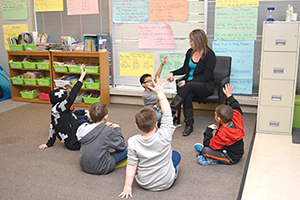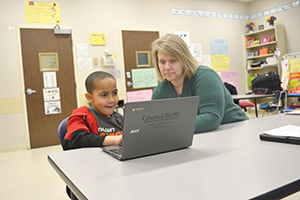By BETSY TAYLOR
There's a classroom inside the hospital at CHI Health Mercy Council Bluffs where public school district educators and hospital therapists have a strong track record of helping children successfully return to school after acute behavioral health treatment.

Students, who have been away from their regular classroom while undergoing behavioral health treatment, are eased back in to the school environment through the Transitions Program. In a classroom at CHI Health Mercy Council Bluffs in Council Bluffs, Iowa, teacher Danielle Alcaraz works with them on new skills to help them return to a traditional classroom.
Andrew Jackson/CHI Health
The Council Bluffs Community School District, located in Iowa just east of Omaha, Neb., and CHI Health Mercy Council Bluffs medical center created the Transitions Program in 2014, so that children who receive psychiatric stabilization services through a Child and Adolescent Partial Hospitalization Program return to their traditional classroom better able to adapt and succeed.
In the Transitions Program, a school district teacher and two teaching assistants employed by the school district teach children from kindergarten through fifth grade using the curriculum being taught in the classroom each child will be returning to. They teach them learning strategies, like how to break up a classroom assignment into smaller, manageable tasks to complete it.
A CHI Health Psychiatric Associates Clinic mental health therapist works with each child on coping strategies, including how to recognize when one is feeling overwhelmed and politely ask for quiet time away from a group setting to calm down.
Staff from the Transitions Program, the school district, and/or the child's principal and guardians meet as needed to discuss progress of children in the program.
Children attend the Transitions Program for six hours a day, and usually stay in it for up to 60 days. Students can return to their traditional classroom for an hour, two hours or three hours a day, as part of the Transitions Program, gradually reintegrating into the school day routine.
As a child returns to school, the Transitions Program team members check in with teachers and family members, to see if they need any assistance with strategies to help the child manage emotions and behaviors.
Children in crisis
Each year, the Council Bluffs Community School District identifies students in need of a mental health assessment and behavioral health support. When a child's failure to complete assignments turns into a pattern, or a child lashes out repeatedly, disrupting class, throwing books or tussling with classmates, district educators may recommend that parents seek out a behavioral health professional who can gauge if therapy including medication would be helpful.
A child struggling in one or more social domains whether in school, at home, with friends or in the community, may need behavioral health care, explained Tina Sedersten, CHI Health partial hospitalization programs manager for Nebraska and Iowa.

A student gets one-on-one time with Council Bluffs Community School District teaching assistant Jill Madsen inside a classroom at CHI Health Mercy Council Bluffs.
Andrew Jackson/CHI Health
Some of the young children with acute behavioral health needs are first diagnosed after they are brought into the emergency room in crisis. Some have experienced a traumatic event and have post-traumatic stress disorder; others have attention deficit hyperactivity disorder and trouble focusing in a traditional classroom setting.
Children who go on to take part in the Transitions Program have psychiatric issues that vary greatly. The program tries not to exclude any child based on diagnosis. It is for children who have completed their partial hospitalization behavioral health care, and need some assistance easing back into their classroom environment.
Gradual reentry
The CHI Health Mercy Council Bluffs medical center provides several levels of pediatric psychiatric care — inpatient care; the partial hospitalization program where young people receive psychiatric treatment during the day; and less intensive outpatient services through CHI Health Psychiatric Associates, which has multiple locations in the region.
The partial hospitalization program provides acute psychiatric treatment on an outpatient basis six hours a day Monday through Friday. The average length of stay is two weeks. A team including a psychiatrist, mental health practitioners, psychiatric nurses and recreational therapists provide care, which can include group, individual and family therapy.
CHI Health Mercy Council Bluffs said in written materials about the Transitions Program that the necessity for the program is tied in part to health care financing.
When insurance companies developed stricter admission criteria for inpatient psychiatric care, the policies resulted in the partial hospitalization program experiencing an increase in patient acuity and shorter lengths of stay, resulting in less time to make the desired impact, Sedersten said. Schools in the district reported having a hard time managing students with behavioral health needs immediately after the children returned from partial hospitalization treatment to the traditional school setting. Some children required readmission to the partial hospitalization program or to inpatient care.
It became apparent that the shift from the partial hospitalization care directly back to the classroom was too abrupt, said Becky Zorn, special education director for the Council Bluffs Community School District. To address this, the school district and the hospital made the mutual decision to create the Transitions Program, she said.
In the 2014-15 school year, when the Transitions Program launched, 28 students from the school district, from kindergarten through fifth grade, entered the program upon their discharge from the partial hospitalization program.
That cohort of 28 students had a 41 percent reduction in the number of inpatient hospitalizations and partial hospitalization admissions in the two years after completing the Transitions Program as compared to their medical histories in the two years prior (from 22 readmissions before the program to 13 in the two subsequent years). There was a 47 percent reduction in the number of their emergency department visits in those same four years (from a total of 51 in the two years prior to the Transitions Program participation to 27 in the subsequent two years). Sedersten said the data show a direct correlation between attendance in the Transitions Program and improved outcomes.
The school district pays the salaries of the teacher and teaching aides for the program, provides transportation for the students and the furnishings and supplies of the school program. The medical center provides the space and security for crisis intervention, Sedersten said. The Transitions Program is not covered by insurance, according to a written program summary from CHI Health, although the mental health therapist can get insurance reimbursement for group, individual and family therapy. This makes up only about 20 percent of her time, Sedersten said.
Help for kids and families
Jennifer Jackson said her 6-year-old son has attention deficit hyperactivity disorder and it's a struggle for him to control his behavior, sit still in class or stand in a line. He has gotten in trouble for being mean to other children and using inappropriate language. About a year and a half ago, "he was kind of out of control," she said, and he was admitted to the partial hospitalization program. A doctor adjusted his medication, which helped, and she credits the Transitions Program for giving him skills to help him return to school. She said the Transitions Program staff used time charts to structure his day into short activities and taught him communication skills, reinforcing polite behavior. She said she's seen a positive change in her son since he completed the program.
Judy Agersea said her 7-year-old son has been enrolled in the Transitions Program twice in recent years, and is now back in class at a public school, where he is experiencing some difficulties. Agersea said it's possible her son may need to be in a smaller, more specialized classroom than the one he's in, with more one-on-one assistance.
She described her son as a bright and wonderful boy, who is intuitive in technology and loves gaming. He has been diagnosed with attention deficit hyperactivity disorder and sometimes has angry outbursts. She said sometimes she refers to his conditions as "Hate-D-H-D."
She's talked to the Transitions Program mental health counselor to strategize about how to keep her cool if her son yells at her. "It's hard," she said of parenting her son. "You never know what will happen," she said.
Copyright © 2018 by the Catholic Health Association
of the United States
For reprint permission, contact Betty Crosby or call (314) 253-3490.